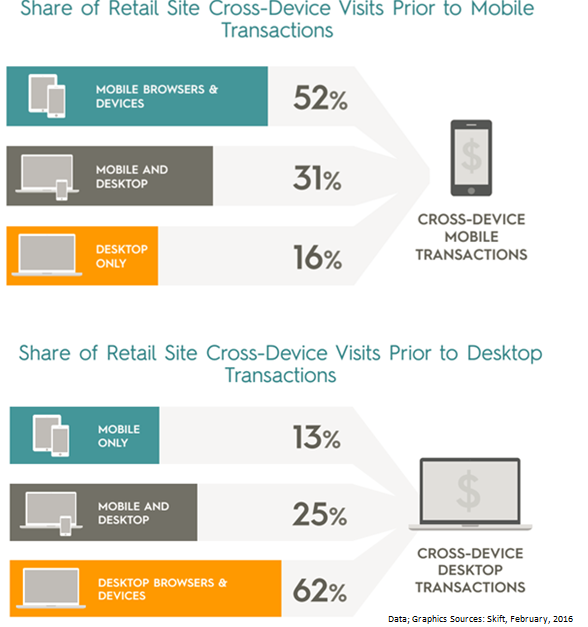Going Small: How Mobile Apps Impact the Travel and Tourism Industry
By Nick Ostdick on May 5, 2016 9:00:00 AM

The travel industry is shrinking. Well, not necessarily the industry per se - in fact, reports from business groups and publications indicate travel was one of the most burgeoning industries in 2015 - but rather one of the primary ways travel companies interact with customers is getting smaller and smaller, more and more agile, in an effort to reach new customers and markets and maintain diversification and growth in 2016 and beyond.
We’re talking about mobile applications and how travel companies are leveraging the devices in your pocket right now to enhance their efficiency and agility in an increasing competitive global marketplace. Smartphones, tablets, laptops, and other mobile devices have not only changed the way customers research and book their travel arrangements, but they’ve also fundamentally shifted the way travel companies view devices as tools for continued interaction and communication with would-be travelers.
It’s no secret today’s traveler exists more and more in a virtual environment via the internet - in a fact, a study released last year by the internet industry company comScore reported mobile devices and related apps were one of the biggest drivers in how the average consumed media on a daily basis, with 88 percent of activity on smartphones and tablets stemming from apps.
With so much of today’s e-commerce dependent upon mobile apps as a way of customer engagement and transaction, travel companies are betting big on providing travelers with responsive, user-friendly applications to serve their booking and travel needs. As you’ll see below, here are 5 important ways travel companies are leveraging mobile apps to create lasting dialogues with customers and position themselves for success in an increasing digitized marketplace.
Customized Services
Because so much of an individual’s e-commerce, business, social, and leisure life is entwined with mobile devices and apps, travel companies have started using apps as a way of targeting customers with customized services, special offers or promotions, discounts, and other perks. Imagine a business traveler is curious about the weather at his destination. A travel company could provide within their app a weather function in which our business traveler can view current and future weather conditions for his arrival, potentially with links and offers for activities based on the weather forecast. Customized services and integrations like this - be it travel for business, leisure, or a combination - provide travel companies a leg-up on the competition, but also gain valuable insights into the wants, needs, and priorities of their users.
Increased Communication
One of the greatest challenges for travel companies today - despite the expediency and ease of communication channels - is the ability to create conversations with customers that continue long after the plane touches down and the bags are unpacked. Mobile apps provide travel companies with an instant and intimate way to keep the conversation going with customers before, during, and after a trip. Whether it’s requesting feedback about an activity or excursion a customer booked, offering similar travel packages, or providing key information about trends in tourism and travel in the hopes of sparking interest in exploring new destinations or activities, mobile apps offer travel companies a direct channel with which to nurture current customer relations and potentially expand that customer-base via word of mouth on social media or travel review websites.
Understanding the Consumer
Utilizing detailed data and metrics about where your customer spends his or her time online, what mobile apps they gravitate toward, what their interests are, and their expectations from a travel company or service are key drivers in sourcing the right products and services from suppliers in order meet your customer’s needs. Essentially, travel companies have begun to view mobile apps as a testing ground or controlled environment where they can gain insights into the browsing and purchasing habits of their customers, and then acting on that data to create offers, discounts, promotions, and messaging that best targets a travel company’s demographic.
Streamlining Transactions
Whether it’s going paperless in providing customers with PDF files, digital receipts or confirmations, or perhaps even passports or other necessary travel documents, travel companies can use apps as a way to streamline transactions and provide travelers with the quick and easy e-commerce experience they’ve come to expect in today’s fast-paced, digital landscape. Not only does a travel company’s capability to provide transactional documents to customers via an app reduce the necessary resources and personnel to complete transactions, it also offers travelers peace of mind in knowing their accommodation information - confirmations, itineraries, boarding passes, etc - will be housed electronically for easy access in the future.
Connectivity
While somewhat related to maintaining the conversation with travelers after the purchasing experience - as well as giving customers a sense of satisfaction with how a travel company operates - mobile apps allow customers and companies to remain connected to each other every step of the way - from research to booking to the vacation itself and beyond. With so many channels available to customers to receive information about travel and tourism, the potential for a travel company’s engagement efforts to become ‘white noise’ increases. However, mobile apps, especially those with a focus on the user, provide travel companies a path to cut through that white noise and reach customers in a medium where they’re not only experienced, but spending an increasing majority of their time.
Download our free eBook and find out more insights about the role of mobile apps in travel!
- travel technology (60)
- Travel Industry (49)
- travel agency (31)
- travel erp (31)
- travel trends (28)
- travel booking system (23)
- TINA (21)
- travel company (19)
- Tour Operator (18)
- Product updates (17)
- Travel Management Company (17)
- AIDA (15)
- TBS (15)
- Business Travel (14)
- dcs plus news (14)
- tour operator solution (14)
- travel website (14)
- travel erp system (13)
- Mobile App (12)
- Travel App (12)
- mid back office solution (12)
- trends (12)
- Corporate Travel (11)
- Industry Events (11)
- Mobile Technology (11)
- TMC (11)
- travel agents (11)
- erp (10)
- erp system (10)
- Tour Operators (9)
- Travel booking engines (9)
- dcs plus (9)
- online travel agency (9)
- travel agent (9)
- Mobile Bookings (8)
- travel (8)
- travel agencies (8)
- 2017 (7)
- Business Traveler (7)
- Mobile Travel (7)
- travel business (7)
- travel software (7)
- Digital Technology (6)
- Insider (6)
- Millennials (6)
- Online booking systems (6)
- Travel Management Companies (6)
- process automation (6)
- travel companies (6)
- Big Data (5)
- Partners interviews (5)
- Tour Operator Software (5)
- customer retention (5)
- travel agency technology (5)
- Booking engines (4)
- CSBT (4)
- Mobile Device (4)
- Mobile travel apps (4)
- OTAs (4)
- Static databases (4)
- Tour Companies (4)
- Travel Policy (4)
- Travel booking systems (4)
- Travel suppliers (4)
- back office automation (4)
- corporate self booking tool (4)
- millennial travelers (4)
- online travel (4)
- responsive travel website (4)
- technology (4)
- travel website conversion (4)
- 2016 (3)
- Content mapping (3)
- Databases (3)
- Demographics (3)
- Food and Adventure Tourism (3)
- Mobile Apps (3)
- Travel Distribution Channels (3)
- Travel Management Software (3)
- Travel customers (3)
- Travel history (3)
- anniversary (3)
- automated processes (3)
- content matching (3)
- global travel industry (3)
- social media (3)
- travel agency workflow (3)
- travel back office (3)
- travel marketing (3)
- travel process automation (3)
- AI in travel (2)
- Advanced Booking Systems (2)
- B2B Travel Resellers (2)
- Bleisure (2)
- Branding (2)
- Business Process Automation (2)
- Business Travelers (2)
- Customer engagement (2)
- Financial Reporting (2)
- Food Tourism (2)
- Inbound Marketing (2)
- Infographic (2)
- Leisure Travel (2)
- Saas (2)
- Templates (2)
- Travel Costs (2)
- Travel bookings (2)
- Travel start-up (2)
- Travel website abandonment (2)
- WTM 2016 (2)
- abandoned travel bookings (2)
- engagement marketing (2)
- internet booking engine (2)
- millennial traveler (2)
- new travel company (2)
- office (2)
- online reputation management (2)
- online travel reviews (2)
- reporting (2)
- software (2)
- start-up tips (2)
- travel agency management (2)
- travel agency website (2)
- travel experience (2)
- travel mobile app (2)
- travel packages (2)
- travel reservation system (2)
- travel system (2)
- travelers (2)
- web-based travel erp (2)
- 2020 (1)
- 360 Customer View (1)
- Advanced Accommodation Contract Management (1)
- Adventure travelers (1)
- Apps (1)
- B2B Reseller (1)
- B2B Resellers (1)
- B2C (1)
- BI Reporting (1)
- Budget traveler (1)
- Cancellations (1)
- Chat (1)
- Chinese millennial (1)
- Cloud (1)
- Cognitive computing (1)
- Comparison shopping (1)
- Conference (1)
- Contact matching (1)
- Content (1)
- Cruise (1)
- Culinary traveler (1)
- Customer relations (1)
- Digital Innovation (1)
- Digital Natives (1)
- Documents (1)
- Emerging market travelers (1)
- Emerging markets (1)
- Errors (1)
- Experimental travel (1)
- Financial Dashboard (1)
- Import rates (1)
- Instant messaging (1)
- Integrate with Accounting Software (1)
- Internet (1)
- Luxury traveler (1)
- Mobile Transaction (1)
- Mobile payments (1)
- NDC distribution (1)
- Operational Reporting (1)
- Reseller networks (1)
- Resellers (1)
- Response (1)
- Subagents Network (1)
- TINA Academy (1)
- TTE (1)
- Travel Reseller Network (1)
- Travel Revenue Management (1)
- Travel booking problems (1)
- Travel finance reporting (1)
- Travel stats (1)
- WTM (1)
- abandonment (1)
- accomodations (1)
- advanced reporting (1)
- airline direct connect technology (1)
- ancillary services (1)
- cloud computing (1)
- collection (1)
- collection challenges (1)
- common data model (1)
- conversion rates (1)
- corporate mobile app (1)
- cost control (1)
- credo ventures capital invests in dcs plus (1)
- customer reviews (1)
- data analysis (1)
- dcs plus credo investment (1)
- dcs plus credo ventures (1)
- deloitte technology fast 500 EMEA (1)
- digital transformation (1)
- e-invoicing KSA (1)
- email marketing (1)
- email marketing for OTAs (1)
- erp e-invoicing (1)
- lost travel bookings (1)
- modern travel agencies (1)
- networks (1)
- new features (1)
- offers (1)
- online customer review (1)
- online reputation (1)
- online travel agencies (1)
- risk management (1)
- sales (1)
- senior travelers (1)
- shopping baskets (1)
- shopping carts (1)
- social network (1)
- standardized processes (1)
- static content (1)
- travel SaaS (1)
- travel account services (1)
- travel agency customers (1)
- travel agency profitability (1)
- travel analytics (1)
- travel blog (1)
- travel planning (1)
- travel reviews (1)
- travel shopping carts (1)
- travel software for agencies (1)
- travel software system (1)
- travel technology europe (1)
- travlist smart mobile app (1)
- trend (1)
- trusted adviser (1)
- trusted advisor (1)
- upsell functionality (1)
- vouchers (1)
- website traffic (1)
- zatca (1)
Subscribe by email
You May Also Like
These Related Stories

Mobile Transactions & the Travel Industry: Infographics for 2016

Keep Connected: How Mobile Travel Apps Promote Customer Retention


No Comments Yet
Let us know what you think